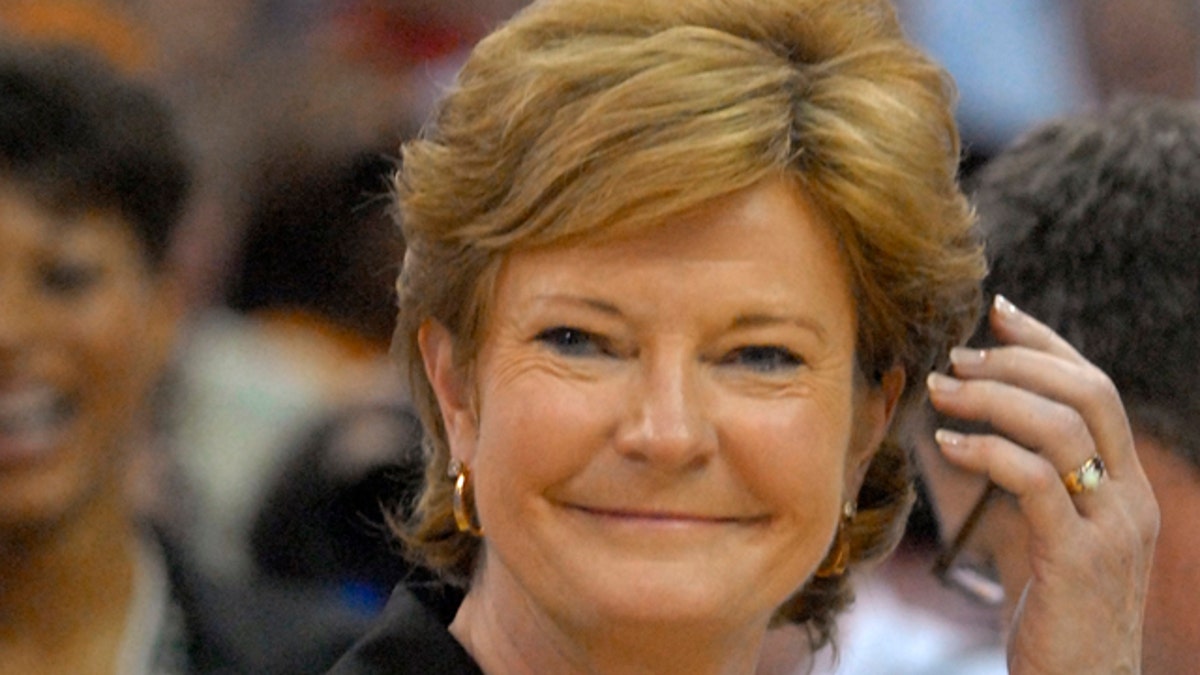
University of Tennessee Lady Volunteers head coach Pat Summitt reacts after her team defeated Rutgers University Scarlet Knights in their NCAA women's championship basketball game in Cleveland, Ohio April 3, 2007. (Reuters)
We know that Alzheimer’s is synonymous with aging and the elderly – with nearly half of people over the age of 85 being afflicted with the devastating disease. But it’s not just the elderly that face this bleak diagnosis. It also affects 5 percent of people under the age of 65. Just ask legendary University of Tennessee women’s basketball coach Pat Summitt.
In a statement released Tuesday by the university, the 59-year-old Hall of Fame coach said she’s been diagnosed with early onset dementia, which could lead to Alzheimer’s. Summitt said she plans to coach the Lady Vols during the 2011-12 season, but she admitted she may have some "limitations."
Katie Henley knows about limitations all too well. Her father was diagnosed with early onset when he was just 41 years old.
"He was misdiagnosed for about two years," she told Dr. Manny Alvarez, senior managing editor of health for FoxNews.com. "He displayed some of the early symptoms of confusion and possibly depression, and they just considered it a depressive disorder."
Dr. Sam Gandy, an associate director at Mount Sinai Alzheimer’s Disease Research Center in New York City , said the prevalence of Alzheimer’s is "exploding" due to the aging of the baby boomer generation.
"Six million people have the disease now and that will double or triple in the next few years," he told FoxNews.com.
Henley, who was 11 when her dad was diagnosed, said the landscape of her home life changed dramatically.
"When you think of a typical family dynamic, you think of the parents taking care of the kids – but when my dad was diagnosed it kind of flipped everything upside down – and we wound up taking care of him," she said. "He kind of started not saying our names. I have two younger siblings and he just kind of generalized us. Instead of saying Katie, Don and Liz, he would say 'you all.' It was definitely difficult to know that he didn’t want to say our names because he was afraid that he would confuse us."
But there was one incident that really stuck out in her mind that she shared with Alvarez.
"He forgot what a spoon was at dinner one night… he just kind of held it up and asked what it was. And he asked what you do with it. And we told him 'Well, you eat with it.' Then he tried to eat with the wrong end."
Eventually, Henley said her family made the decision to place her father in an assisted-living facility – but not before her mother made three promises to him.
"One, that he wouldn’t die alone. Two, that she would do her best to protect us from the disease, and also that, you know, he would be able to see us, but she wouldn’t force us to go see him, and that was a conjoined decision between my dad and my mom after he was diagnosed because he really didn’t want us to be horribly traumatized by this – by having to eat, sleep and breathe Alzheimer’s all the time."
Henley's dad eventually died of the disease at the age of 45.
There’s an estimated 6 million people living with Alzheimer’s, and that number is expected to rise. That’s why experts like Gandy say it’s imperative to start pouring more money into research.
"Right now, we now spend about a penny for every $3.50 we spend on care. The investment into research is very low and dwindling, less than 1 percent of the whole National Institutes of Health budget goes to Alzheimer’s disease."
And as Henley put it, this is "a problem of her generation that we have to fix" and one that we need to be open and honest about.
"Alzheimer’s is kind of the disease that you don’t really see because everybody keeps it quiet and you don’t want to destroy the dignity of that person.,” she said. “But it is really, really important that we get out there because it is becoming so prevalent and I don’t want anyone else to have to go through it – because it’s a traumatic thing."
Summitt, who went to the Mayo Clinic in May after experiencing memory loss, is being praised by experts for disclosing her diagnosis.
John Morris, a physician and director at the Alzheimer’s disease research center at Washington University in St. Louis, Mo., told USA Today that "she deserves tremendous credit for announcing her illness. This underscores the point that people who are not older can also get dementia. It is key for others to know by recognizing and diagnosing early."
Summitt told the Knoxville News Sentinel that she plans to rely on medication and mental exercises to manage the dementia.
Click here for more information on Alzheimer’s from the Mayo Clinic.
You can check out USAgainstAlzheimer’s.org, which is a resource for both advocates who want to get involved as well as caregivers and physicians.








































